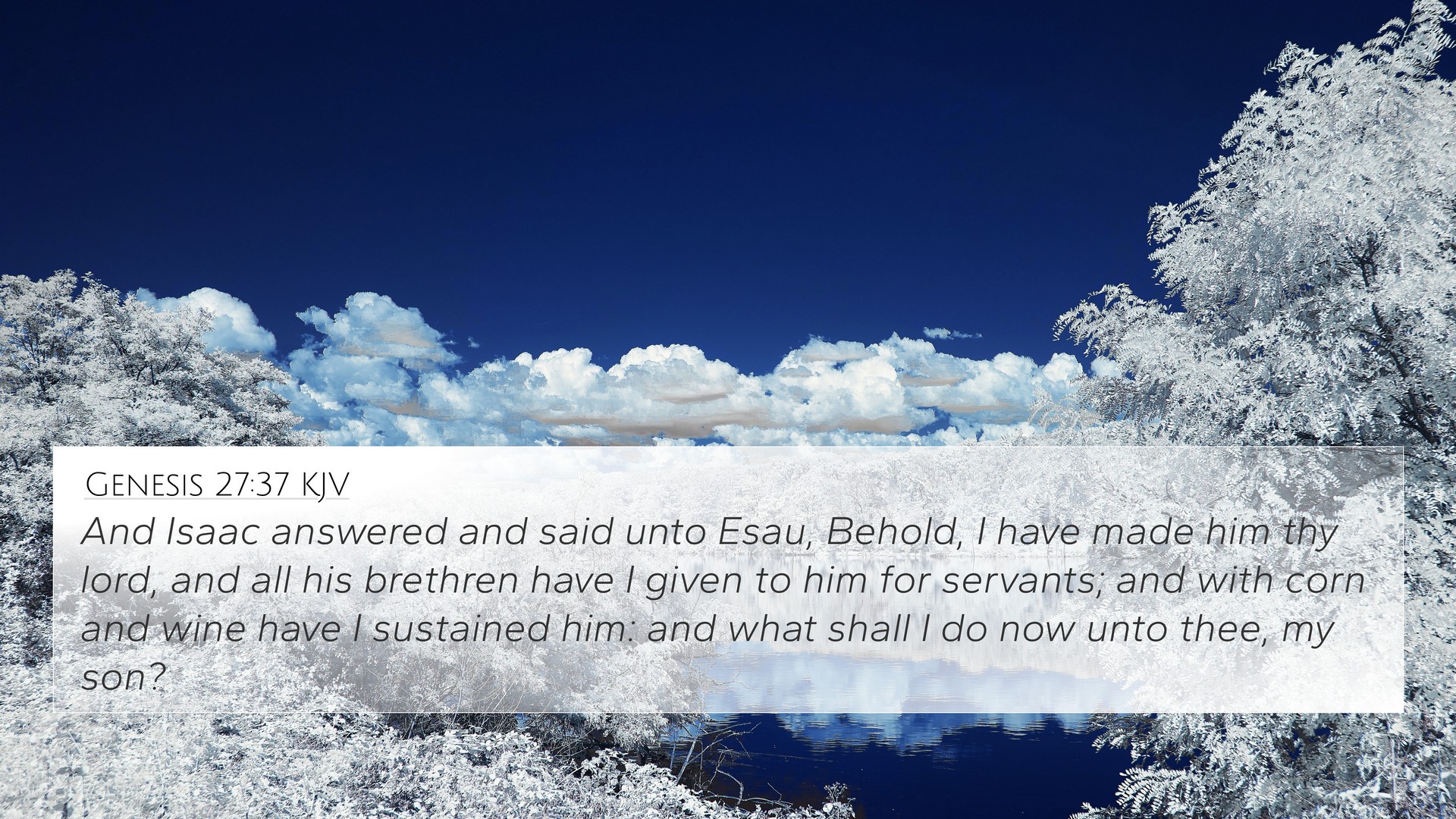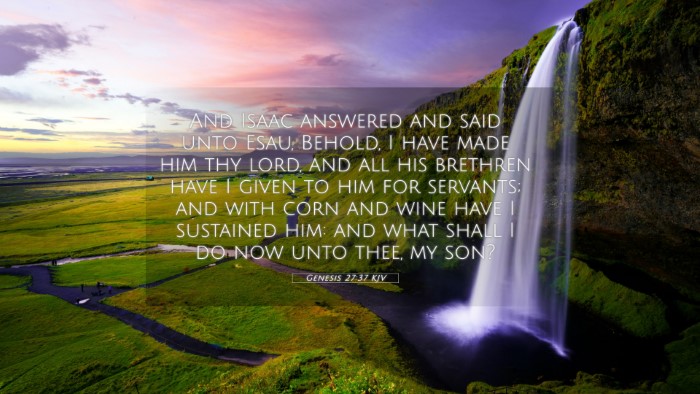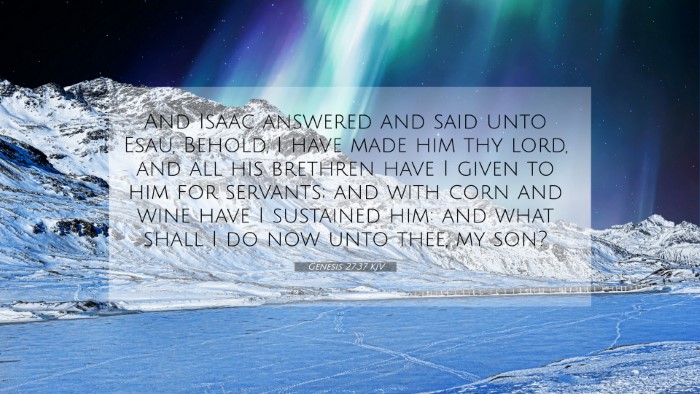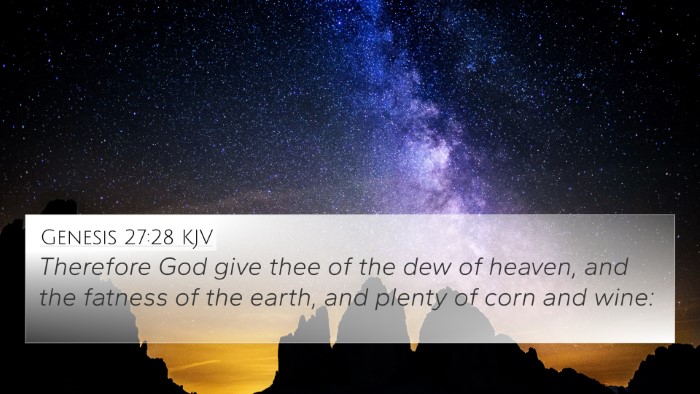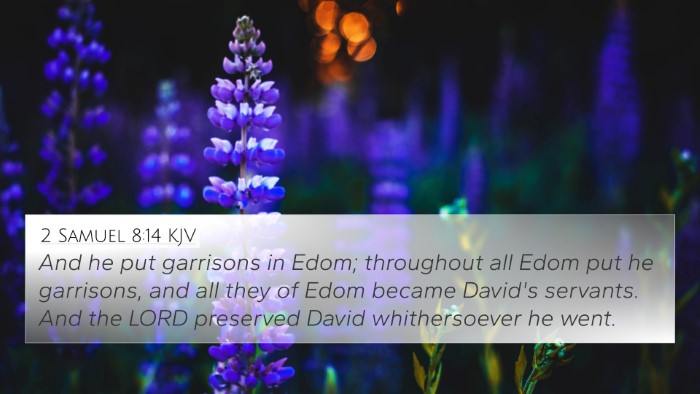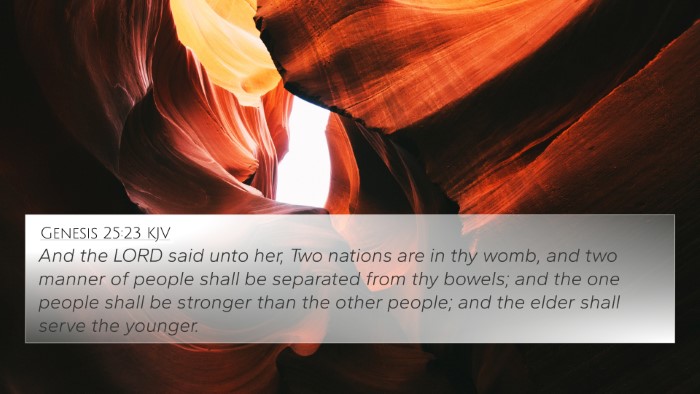Understanding Genesis 27:37
In Genesis 27:37, the verse reads: "And Isaac answered and said unto Esau, Behold, I have made him thy lord, and all his brethren have I given to him for servants; and with corn and wine have I sustained him: and what shall I do now unto thee, my son?"
This verse occurs in a critical narrative of the Old Testament, where Isaac, the patriarch, unwittingly blesses his son Jacob, believing him to be Esau. This moment underscores themes of deception, familial conflict, and the sovereign choices of God.
Commentary Insights
Insights from various public domain commentaries provide a rich understanding of this verse:
-
Matthew Henry:
Henry explains that Isaac's response is a testament to the irrevocability of his blessing. Once pronounced, blessings cannot be undone, which illustrates God's covenantal promises.
-
Albert Barnes:
Barnes notes that Isaac's lament points to his heart's turmoil, revealing his emotional struggle as a father. Furthermore, it highlights the complexities of familial relationships within the biblical narrative.
-
Adam Clarke:
Clarke emphasizes the significance of the birthright and blessing, indicating that the elders' portion is solemn and impactful. Clarke suggests this moment encapsulates God's predetermined plan for Jacob.
Theological Implications
The implications of Genesis 27:37 extend into larger theological concepts:
- Divine Sovereignty: The text illustrates God's sovereignty in the choice between Jacob and Esau, reflecting the doctrine of election.
- The Nature of Blessings: It points to the weight of blessings, which are significant and not easily altered, akin to God's promises to humanity.
- Human Agency and Divine Will: The story intertwines human deception with divine intention, showing how God works through flawed individuals to fulfill His purposes.
Cross-Referencing Related Verses
Genesis 27:37 is connected to several other biblical texts that enhance its understanding. Key cross-references include:
- Romans 9:10-13: Discusses God's choice of Jacob over Esau as a demonstration of divine sovereign election.
- Hebrews 12:16-17: Warns against the characteristics of Esau, who despised his birthright, further elaborating on the consequences of such actions.
- Genesis 25:23: The prophecy regarding the struggle between Jacob and Esau sets the stage for understanding God's purpose.
- Malachi 1:2-3: References God's love for Jacob and hatred for Esau, showcasing the ongoing relational dynamics between these two nations.
- Genesis 49:26: Jacob’s role as the chosen lineage is reiterated, revealing the implications of Isaac’s blessing.
- Matthew 1:2-3: Lists Jacob in the genealogy of Christ, displaying the messianic significance of this narrative.
- James 1:17: Talks about God not changing, which reflects on the unalterable nature of the blessings He gives, resonating with Isaac's plight.
Conclusion
The complexities within Genesis 27:37 remind believers of the multifaceted truths found throughout Scripture. As one delves into the implications of Isaac's statement, they explore themes of family dynamics, divine destiny, and God's overarching plan throughout biblical history.
Using tools for bible cross-referencing, one can uncover deeper connections within the text, leading to enhanced understanding and appreciation for the intricacies of the biblical narrative.
Thematic Bible Verse Connections
Cross-referencing Bible verses reveals thematic strands that run through Scripture:
- The Scarcity of Blessings: Genesis 27 resonates with the notion that God's blessings are rare and valuable.
- Sibling Rivalry: Exploring Genesis 4:8, which presents Cain and Abel's conflict, alongside Isaac's blessing narrative, illustrates ongoing biblical themes.
- The Consequences of Deception: This narrative reflects the broader theme of deception throughout the Scriptures, linking to 2 Samuel 13:12 and the story of Tamar.
Cross-Referencing Methods
To deepen understanding and interpret biblical themes effectively, employing cross-referencing Bible study methods is crucial. Here are some techniques:
- Utilize a bible concordance to locate keywords and their occurrences throughout Scripture.
- Engage in systematic studies that track themes across both the Old and New Testament.
- Leverage resources like a bible cross-reference guide to explore how different verses relate and support one another.
